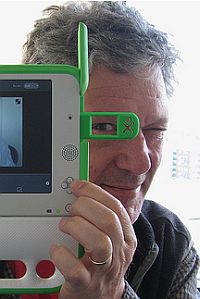How to Blog for Professional Success in International Development
“We need a website. Who wants to figure that out?” says my new boss in the very first staff meeting I attend on the very first day of my new job. “I will,” I answered, and so in 1995, I started blogging, before there was even a term for it. Blogging got me on 60 […]
Read More3 Surefire Steps to Securing a Kick-Ass ICT4D Job
The response to my recent offering to help you get an amazing ICT4D dream job in 2011 has been overwhelming – I can barely keep up with the individual requests for help. So to speed up the knowledge sharing, I present to you the 3 surefire steps to securing a kick-ass ICT4D job (or any […]
Read MoreHow to Get an Amazing ICT4D Dream Job in 2011
It’s damn hard to get a job in international development. And if you’re geeky and want to do ICT4D – use information and communication technologies for development, it’s even harder. Yet every year several hundred people graduate with international development degrees, many of them hoping to start a career in ICT4D. An equal number of […]
Read MoreHow Donors Can Expand National Health Information Systems
Vital Wave Consulting has asked my opinion a very simple, yet profound question:
What should the donor community do to expand national health information systems in the developing world?
Speaking as a technologist on a mission to change the way international development employs information and communication technology (ICT) to reach its aims of economic and social development, I am honored for the opportunity to present the key activities I believe donors need to engage in immediately to better implement national HIS.
Recognize Problems Are Human, Not High-Tech
In Washington DC, I convene the Technology Salon a monthly conversation between international and technology professionals, and recently we tackled the barriers to effective deployment of national health information systems. After a hour of debate, we came to the conclusion that the key national HIS success technology is change management.
That is deploying a national health information system successfully does not necessarily require the high-end technology resources available to richer countries. The major hurtles to successful national health information systems are human, not high-tech.
Having a clear goal of improving data quality, and a solid change management approach to achieve is the critical success factor. And this can be accomplished in countries as varied in resources as Belize, India, and Sierra Leone, regardless of what technology or technical approach is used.
Technology Salon: A Community of Practice
In April of 2008, I started the Technology Salon as a forum where technology and development professionals could share there opinions on emerging trends in information and communication technologies and international development in an intimate and informal discussion around:
- technology’s impact on donor-sponsored technical assistance delivery, and
- private enterprise driven economic development, facilitated by technology.
Now, almost a year later, the Technology Salon is developing into a real community of practice – a network of development and technology professionals who share a common passion for ICT4D, and through regular interaction and communication, are improving their knowledge and implementation expertise in empowering development with technology.
From its inception and reinforced through feedback from its participants, I’ve found there are three attributes keys to the Technology Salon success and growth:
- Conversation, not presentation
The Technology Salon is primarily a forum for discussion, so presentations are discouraged and Power Point is generally banned. Speakers have only 10-15 minutes at the beginning to present their activity, before participants are free to ask questions, share their own experiences, and drive the conversation in a direction that interests them. This both brings forth the group’s knowledge and keeps participants engaged for the full meeting. - Intimacy of participants:
The Technology Salon attendance is capped at 15 people to make sure each participant has the opportunity to speak and share their experience. This cap also encourages pre-registration and subsequent attendance. Last but not least, it allows for quality pre-and post-event networking by participants. - Confidentiality of opinions:
The Technology Salon employs the Chatham House Rule – what is said in its discussions can only be attributed to the Salon itself, not to any specific participant. At the same time, the Salon is not recorded nor the discussion transmitted outside its meeting place. These precautions allow participants to speak their opinions freely, thoughts that would not be shared if participants worried about attribution or out-of-context quoting.
In 2009, I look to improve on the Technology Salon’s success while maintaining its three key attributes – conversation, intimacy, privacy. Its goal is to evolve beyond its current exclusive nature into a standard of discourse between technology and development professionals.


